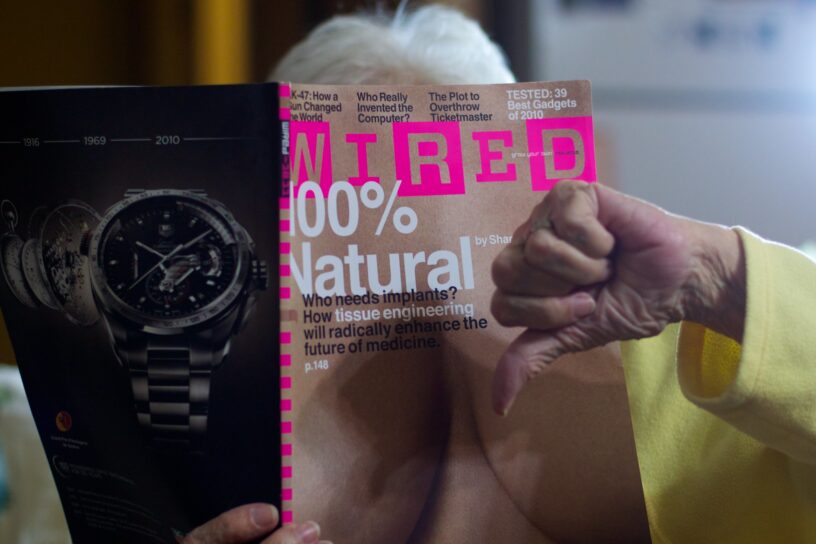WIRED article calls for ideological ‘purge’ of scientific journals
WIRED, a monthly magazine that specializes in writing on technological innovation, uses the slogan “WIRED is where tomorrow is realized.” Let’s hope not. Because if it is, then tomorrow will be a dystopian nightmare.
The magazine recently published an article called “Science Journals Are Purging Racist, Sexist Work. Finally.” The authors, Adam Marcus and Ivan Oransky, are the founders of Retraction Watch, an ostensibly non-partisan website that keeps track of retractions from scientific journals. You might expect people who have an important role in scientific quality control to think clearly and respect impartiality. Sadly, their WIRED piece is poorly reasoned and betrays an authoritarian bend of mind.
Marcus and Oransky assert that a purge of politically incorrect articles from scientific journals is under way and speak as if this is an unqualifiedly good thing. They begin their article by briefly mentioning the three articles that were retracted “after outraged readers took to social media”:
One paper from 2012 linked darker skin to aggression and sexuality in humans. Another from that year claimed to show that women with endometriosis are more attractive. A third, published last December, lamented physicians who posted casual pictures of themselves online—including some in which they’re wearing bikinis—as being unprofessional.
Note the way that they simply tick off the offensive conclusions, as if they must be regarded as self-evidently wrong. Rhetorically, the purpose of the opening seems to be to startle their readers into asking how such awful things could have been published in the first place, a question they soon raise themselves:
It’s playing like a preview for The Purge: Academia. Just as politicians and entertainers are confronted with years-old tweets that aren’t quite in keeping with the image they want, journals have been faced with ugly papers from their archives—some old and long-ignored—that their readers find unsettling. These papers were deeply flawed, and removing them from the literature is a good thing. But the reactive nature of the moves raises questions. Publishers’ typical narratives would suggest that problems such as these would be caught by peer review, before a manuscript is accepted, rather than acknowledged only later, in the middle of a public backlash.
This should raise red flags. The practice of confronting politicians and entertainers – and, not mentioned here, conservative applicants to Harvard University – with old tweets to damage their careers doesn’t strike everyone as a great thing. It’s far from obvious, to put it mildly, that this should be institutionalized in science.
One of the other cases Marcus and Oransky mention is an editorial by cardiovascular physician Norman C. Wang criticizing affirmative action in medical schools. This was retracted from the Journal of the American Heart Association after a social media pile-on. A tweet from one of his colleagues at the University of Pittsburgh Medical Center suggests that he was removed as director of the UPMC’s electrophysiology fellowship program because of this editorial.
Does this not raise worries about cancel culture and ideological double-standards? Marcus and Oransky perfunctorily address those concerns:
Indeed, the fact that journals waited nearly a decade after publication to issue some of these retractions—and then moved very quickly—hints at a sliver of truth in the conservative critique. If a paper from 2012 didn’t meet a journal’s standards for scholarship to begin with, what’s so different now?
That question is backwards. All of these articles were judged to be publishable by the normal process; if they were good enough then, why aren’t they good enough now? Rather than introduce any nuance into the piece, the acknowledgement of the “conservative” critique – though it can be made by anyone right, left or center who believes science shouldn’t be politicized – gives the Marcus and Oransky the opportunity to endorse the political double-standard:
The critics are right: Journals do have a double-standard, and it is political. They move briskly to pull unworthy papers tinged by politics while ignoring hundreds, or likely thousands, of credible allegations of fraud or major error…. Of course, no one (that we know of, at least) is arguing that #AllPapersMatter, and not all bad articles are created equal. For example, a paper that advocates racist pseudoscience almost certainly would cause more harm than one that overhypes the benefits of doing a Superman flex in the bathroom mirror before a job interview, or an uncited and entirely forgettable article with one or two duplicated figures.
Marcus and Oransky mention two types of studies here: studies that support politically incorrect conclusions, and papers of no clear consequence. But what about papers that support left-wing conclusions, such as those that hype “stereotype threat” or “implicit bias”? No mention of those. Flaws that overstate left-wing conclusions are unlikely to provoke these Twitter mobs. They might provoke different Twitter mobs from the right, but the academic establishment will surely ignore those clamors.
Marcus and Oransky seem confident that any purged paper will be retracted for scientific, not political, reasons. But their own examples don’t support this convincingly. Consider the editors’ statement at the Journal of Vascular Surgery about the article “Prevalence of unprofessional social media content among young vascular surgeons.” The chastened editors mention methodological objections, but don’t actually name one, let alone one serious enough to warrant retraction.
One of the primary rationales they do mention is that “the authors did not receive the approval of the Association of Program Directors in Vascular Surgery (APDVS) to use its database in identifying the vascular surgeons in training who were evaluated for their participation in social media.”
Would this have been deemed a good reason to retract a paper that argued for a politically correct conclusion? Suppose that the researchers had used the APDVS database, again without APDVS permission, to argue that racial minorities are underrepresented among young vascular surgeons, and that this is bad. Would anyone have complained? My intuition: unlikely. More to the point: this supposed ethical breach doesn’t render the study junk science. Marcus and Oransky convey the impression that the only papers subject to being “purged” will be garbage.
This raises an ancillary concern. What if organizations that have control over important information decide only to conceal it from researchers whose work they deem likely to support conclusions they disapprove of? The more such organizations see themselves as having political missions, the more likely this is to be the case.
The editors’ statement also mentions they heard from readers who expressed “great concerns about… [the] lack of diversity of the authors collecting the data…” One wonders precisely how “diverse” the authors must be in order to collect data. The fact that this absurd complaint is mentioned is evidence of ideological bias in the decision to retract.
They go on to mention papers that were retracted deservedly, such as the notorious case of a debunked study linking vaccinations with autism. This muddies the water since the issue at hand is politically motivated retraction. The authors conclude:
Journals want us to trust what’s in their name, even more so now that their monopoly on scientific communication has begun to falter. But every time a reader sees a paper with fatal flaws that hasn’t been retracted, that trust erodes a little further. The double-standard doesn’t help. By all means pull all the racist, sexist papers built on faulty premises. But then, let the purge continue: keep digging deep into the archives to remove the science that’s bad for other reasons, too.
Of course an open political purge might also very considerably erode trust in science. Marcus and Oransky are disturbingly blithe, even saying: “Let the purge continue.” They presumably wouldn’t be so nonchalant about a purge from the right. Clearly, Marcus and Oransky think that they will never find themselves on the business end of this purge. They should be warned: people have been wrong about that sort of thing before.




hotshot bald cop
Wonderful views on that!
pidarasGix
“Maybe his dad is right.” He thinks to himself as he continues with his intense fondling of his fiery red cock.
black and white porn
lohGix
“Back in the day, back before we turned into a modern society, a man would grab another man’s balls and swear an oath on them in his hand and state his words to be true. To be a friend” His father says. “Do you know what I mean, son?”
hotshot bald cop
I didn’t know that.
Alexandre
I read everything, congratulations for the post congratulations on the text knowledge is always welcome very good matter.
Your website is amazing congratulations, visit mine too:
https://b9g.net
.